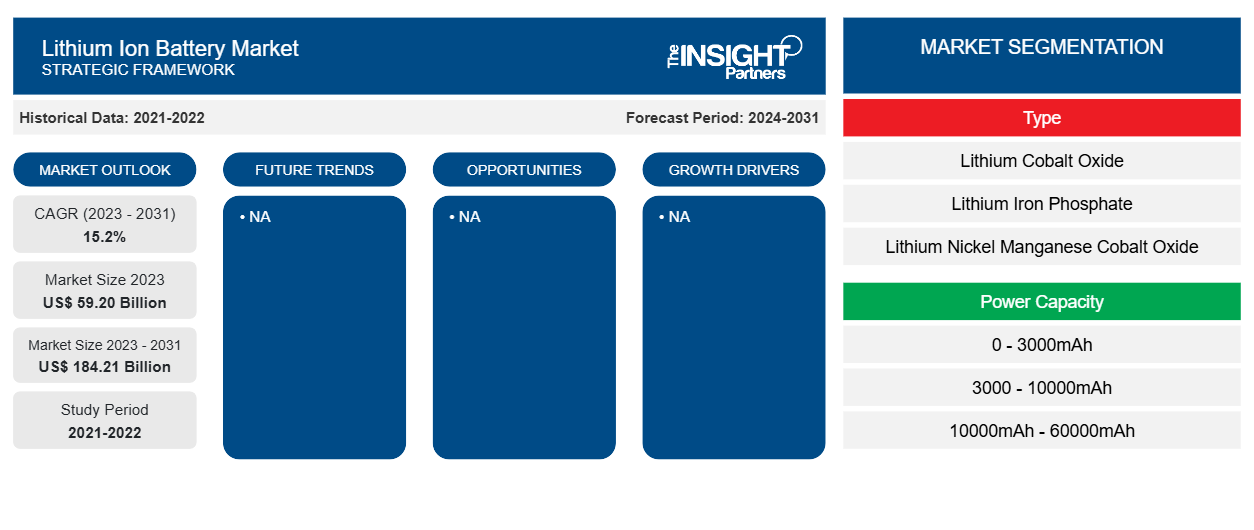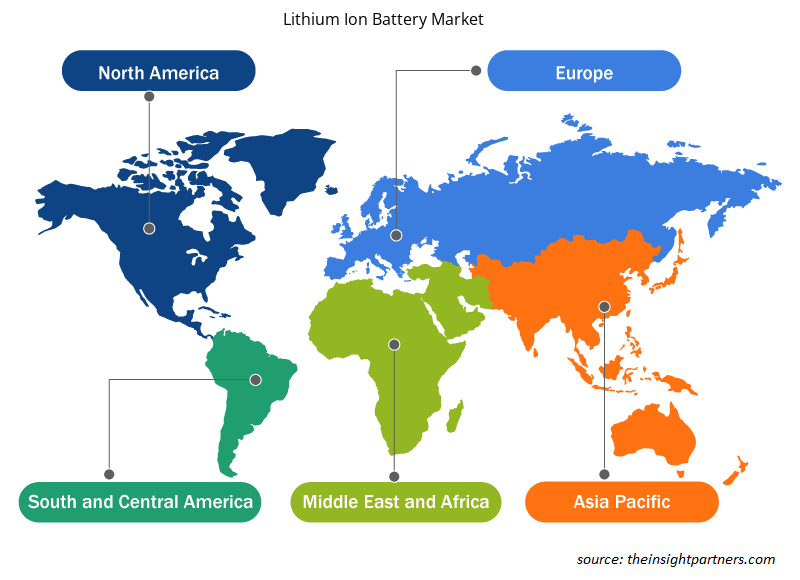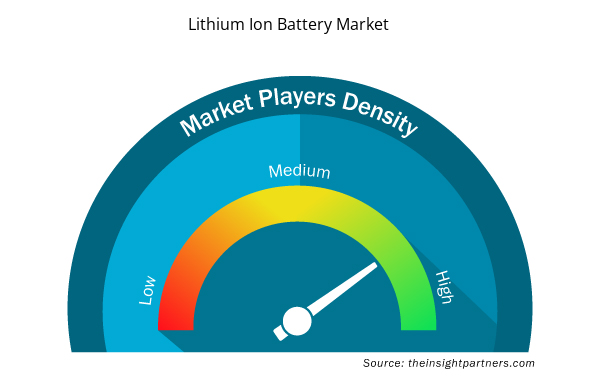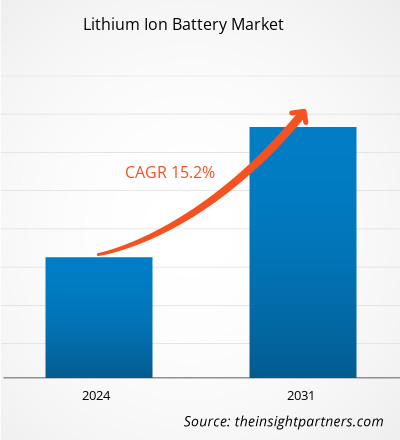The Lithium Ion Battery Market size is projected to reach US$ 184.21 billion by 2031 from US$ 59.20 billion in 2023. The market is expected to register a CAGR of 15.2% in 2023–2031. The automotive sector is predicted to increase significantly because of the low cost of lithium-ion batteries.
Lithium Ion Battery Market Analysis
Lithium-ion batteries are frequently used as backup power sources for commercial buildings, data centers, and organizations. Additionally, lithium-ion batteries are chosen for energy storage in home solar PV systems. These reasons will drive the expansion of energy storage applications during the predicted period. Lithium-ion batteries are utilized in a variety of industrial applications, including power tools, cordless tools, maritime equipment and machinery, agricultural machinery, industrial automation systems, aviation, military and defense, electronics, civil infrastructure, and oil and gas.
Lithium
Ion Battery Market Overview
The lithium-ion battery market refers to the global industry that produces, distributes, and sells lithium-ion batteries. A lithium-ion battery is a rechargeable battery in which lithium ions serve as the primary charge carriers. These batteries have a wide range of applications, including portable devices, electric vehicles (EVs), energy storage systems, and renewable energy integration. The market includes all activities associated with lithium-ion battery manufacture, research & development, raw material procurement, component production, assembly, distribution, and sales. It consists of a diverse group of stakeholders, including battery manufacturers, raw material and component suppliers, battery pack assemblers, battery management system providers, and end users.
Customize This Report To Suit Your Requirement
You will get customization on any report - free of charge - including parts of this report, or country-level analysis, Excel Data pack, as well as avail great offers and discounts for start-ups & universities
Lithium Ion Battery Market: Strategic Insights

- Get Top Key Market Trends of this report.This FREE sample will include data analysis, ranging from market trends to estimates and forecasts.
Customize This Report To Suit Your Requirement
You will get customization on any report - free of charge - including parts of this report, or country-level analysis, Excel Data pack, as well as avail great offers and discounts for start-ups & universities
Lithium Ion Battery Market: Strategic Insights

- Get Top Key Market Trends of this report.This FREE sample will include data analysis, ranging from market trends to estimates and forecasts.
Lithium Ion Battery Market Drivers and Opportunities
Increasing Demand for Battery-Powered Material Handling Devices Across Industries to Favor Market
Material-handling equipment has evolved to meet evolving industry requirements. The material-handling equipment business has seen many technological improvements over time. Battery-powered automated material handling and lifting equipment, such as guided vehicles, elevating equipment, industrial trucks, and intralogistics systems, has advanced technologically. Lithium-ion batteries are widely used in material-handling equipment, including forklifts, robots, and ground support.
Government’s Policies And Regulations
Governments all over the world are creating rules and regulations to encourage the use of electric vehicles, renewable energy, and energy storage technologies. These efforts offer incentives, subsidies, and tax breaks, which boost demand for lithium-ion batteries. Ongoing battery research and development efforts are resulting in ongoing advances in lithium-ion batteries. Increased energy density, longer cycle life, faster charging, and improved safety features are all examples of advancements. These developments are propelling market growth by broadening the spectrum of applications for lithium-ion batteries.
Lithium Ion Battery Market Report Segmentation Analysis
Key segments that contributed to the derivation of the lithium ion battery market analysis are type, power capacity, and application.
- Based on type, the lithium ion battery market is divided into lithium cobalt oxide, lithium iron phosphate, lithium nickel manganese cobalt oxide, lithium manganese oxide, and lithium titanate oxide. The lithium cobalt oxide segment held a larger market share in 2023.
- By power capacity, the market is segmented into 0 - 3000mAh, 3000 - 10000mAh, 10000mAh - 60000mAh, and >60000mAh. The 0 - 3000mAh segment held the largest share of the market in 2023.
- In terms of application, the market is bifurcated into consumer electronics, automotive, industrial, energy storage systems, aerospace & defense, medical devices, and others. The automotive segment dominated the market in 2023.
Lithium Ion Battery Market Share Analysis by Geography
The geographic scope of the lithium ion battery market report is mainly divided into five regions: North America, Asia Pacific, Europe, Middle East & Africa, and South America/South & Central America. Asia Pacific has dominated the lithium ion battery market. The Asia Pacific market is segmented into China, Japan, India, Australia, South Korea, and the Rest of Asia Pacific. The region is a leading maker and consumer of lithium-ion batteries. Asia Pacific is experiencing high demand for lithium-ion batteries from top consumer electronics makers. Technological advancements in consumer electronics in the Asia Pacific are driving growth in the Lithium-ion battery market. China is a major producer of lithium-ion batteries, accounting for the majority of the market in Asia Pacific. Asia Pacific countries are investing more in R&D to create new battery technologies, which is driving growth in the market.
Lithium Ion Battery Market Regional Insights
Lithium Ion Battery Market Regional Insights
The regional trends and factors influencing the Lithium Ion Battery Market throughout the forecast period have been thoroughly explained by the analysts at Insight Partners. This section also discusses Lithium Ion Battery Market segments and geography across North America, Europe, Asia Pacific, Middle East and Africa, and South and Central America.

- Get the Regional Specific Data for Lithium Ion Battery Market
Lithium Ion Battery Market Report Scope
| Report Attribute | Details |
|---|---|
| Market size in 2023 | US$ 59.20 Billion |
| Market Size by 2031 | US$ 184.21 Billion |
| Global CAGR (2023 - 2031) | 15.2% |
| Historical Data | 2021-2022 |
| Forecast period | 2024-2031 |
| Segments Covered |
By Type
|
| Regions and Countries Covered | North America
|
| Market leaders and key company profiles |
Lithium Ion Battery Market Players Density: Understanding Its Impact on Business Dynamics
The Lithium Ion Battery Market market is growing rapidly, driven by increasing end-user demand due to factors such as evolving consumer preferences, technological advancements, and greater awareness of the product's benefits. As demand rises, businesses are expanding their offerings, innovating to meet consumer needs, and capitalizing on emerging trends, which further fuels market growth.
Market players density refers to the distribution of firms or companies operating within a particular market or industry. It indicates how many competitors (market players) are present in a given market space relative to its size or total market value.
Major Companies operating in the Lithium Ion Battery Market are:
- Automotive Energy Supply Corporation
- Samsung SDI Co. Ltd.
- Tesla, Inc.
- Toshiba Corporation
- A123 Systems LLC
- GS Yuasa International Ltd.
Disclaimer: The companies listed above are not ranked in any particular order.

- Get the Lithium Ion Battery Market top key players overview
Lithium Ion Battery Market News and Recent Developments
The lithium ion battery market is evaluated by gathering qualitative and quantitative data post primary and secondary research, which includes important corporate publications, association data, and databases. The following is a list of developments in the market:
- In January 2023, Toshiba Corporation (TOKYO: 6502), a company dedicated to advancing carbon neutrality through its technologies, products, and services, today expanded its SCiB product offering with the launch of an innovative 20Ah-HP rechargeable lithium-ion battery cell that delivers high-energy and high power at the same time.
(Source: Toshiba Corporation, Company Website, 2023)
- In June 2023, EnerSys(R) (NYSE: ENS) enhanced its lithium-based capabilities with the launch of an EnerSys Advanced Systems (EAS) unit in Budapest, Hungary, in addition to an existing EAS unit located in Horsham, Pa., near Philadelphia. These enhancements are in response to the growing demand for lithium-ion batteries. The new EAS unit in Budapest, led by Dr. Laszlo Nagy, provides customers with additional resources for the design and assembly of advanced lithium-ion batteries. It also employs a team of engineers for customer assistance in lithium-based applications.
(Source: EnerSys(R), Company Website, 2023)
Lithium Ion Battery Market Report Coverage and Deliverables
The "Lithium Ion Battery Market Size and Forecast (2021–2031)" report provides a detailed analysis of the market covering below areas:
- Market size and forecast at global, regional, and country levels for all the key market segments covered under the scope
- Market dynamics such as drivers, restraints, and key opportunities
- Key future trends
- Detailed PEST/Porter's Five Forces and SWOT analysis
- Global and regional market analysis covering key market trends, major players, regulations, and recent market developments
- Industry landscape and competition analysis covering market concentration, heat map analysis, prominent players, and recent developments
- Detailed company profiles
- Historical Analysis (2 Years), Base Year, Forecast (7 Years) with CAGR
- PEST and SWOT Analysis
- Market Size Value / Volume - Global, Regional, Country
- Industry and Competitive Landscape
- Excel Dataset



Report Coverage
Revenue forecast, Company Analysis, Industry landscape, Growth factors, and Trends

Segment Covered
Type , by Power Capacity , by Application

Regional Scope
North America, Europe, Asia Pacific, Middle East & Africa, South & Central America

Country Scope
US, Canada, Mexico, UK, Germany, Spain, Italy, France, India, China, Japan, South Korea, Australia, UAE, Saudi Arabia, South Africa, Brazil, Argentina
Frequently Asked Questions
The global lithium ion battery market was estimated to be US$ 59.20 billion in 2023 and is expected to grow at a CAGR of 15.2% during the forecast period 2023 - 2031.
Increasing demand for battery-powered material handling devices across industries and technological advancement in wearable electronics are the major factors that propel the global lithium ion battery market.
Electrical vehicle boom is anticipated to play a significant role in the global lithium ion battery market in the coming years.
The key players holding majority shares in the global lithium ion battery market are Automotive Energy Supply Corporation, Samsung SDI Co. Ltd., Tesla, Inc., Toshiba Corporation, and A123 Systems LLC.
The global lithium ion battery market is expected to reach US$ 184.21 billion by 2031.

 Get Free Sample For
Get Free Sample For